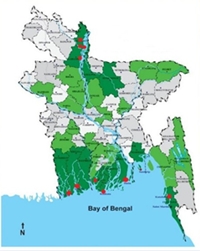Terms of Reference for the review of the CIDRR approach 1. Background and Context: Bangladesh is one of the most at-risk countries to climate change and frequent natural disaster phenomena with flood, cyclones, and river erosion expected to increase in frequency and severity over the coming decades. People living in the north-west flood plains and southern coastal belt of Bangladesh are particularly vulnerable. These deltaic areas have suffered extensively during floods and river erosion every year. The floods of 2016 caused damage and created long-term vulnerability due to breached embankments and loss of household assets. One of these vulnerable areas is Rowmari upazilla in Kurigram district. The Rowmari upazilla is geographically located in the eastern side of Chilmari and south-eastern part of Kurigram Sadar and on the bank of local Jinjiram river. The population is mostly landless and occupied with fishing and agriculture practiced in a very traditional way with low productivity. In addition, people are not well acquainted with other options of livelihoods and ways to reduce risk. The local actors are the first and main responders for the preparedness and after a disaster strikes: they know the context and speak the language; they are there, and will stay there long after external actors have left. A growing body of evidence demonstrates that engagement of the local stakeholders/actors enhance the relevance, appropriateness, accountability and connectedness of risk reduction and humanitarian responses, and ensure better linking up of preparedness, relief, rehabilitation and development.
The CIDRR approach has been developed by Friendship based on previous experiences and in consultation with community people, stakeholders, field staff, and some academics and with the support from SIDA/ERIKS and Friendship-Luxembourg (with support from the Luxembourg Ministry of Development Cooperation). The CIDRR approach is presently implemented in the following locations |
||

